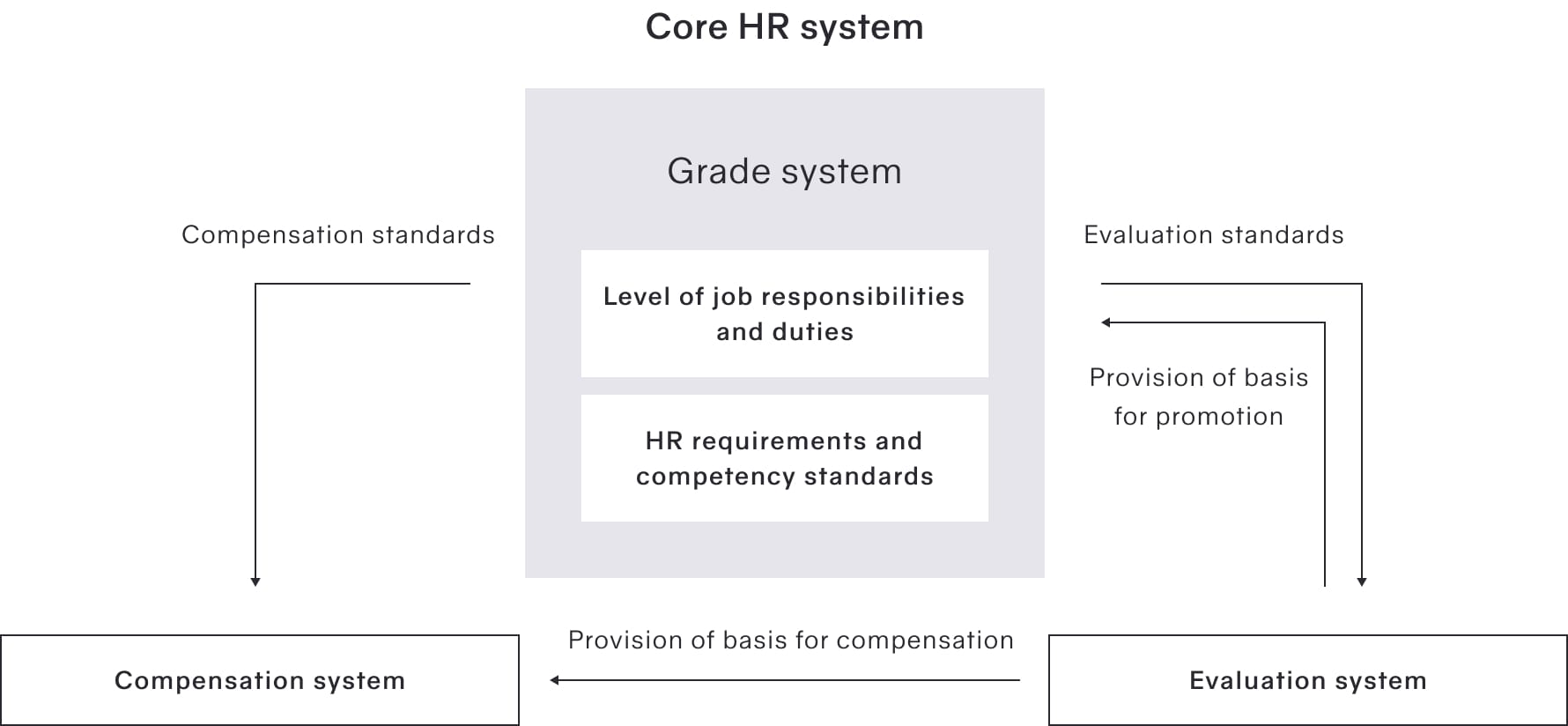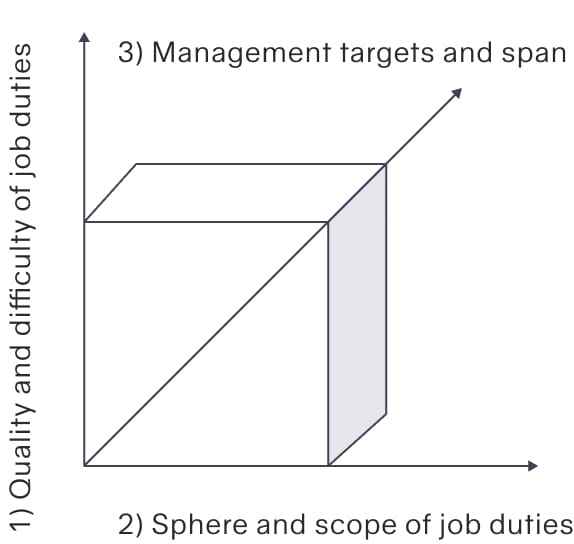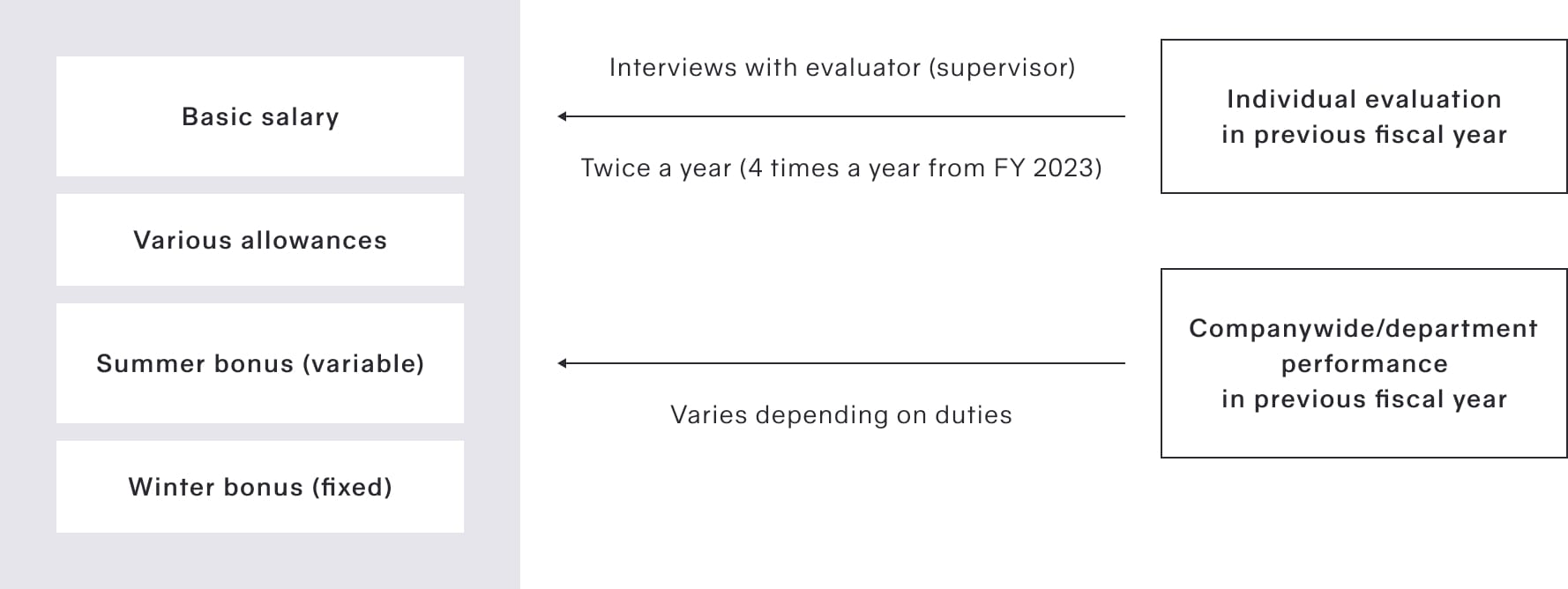Fair Compensation, Benefits and Evaluations Sustainability
Basic Concept
Aiming to maximize human capital is one of our highest-priority management issues. It is important that all employees who work at Goldwin firmly understand the roles that they are expected to perform, and that there are means for them to contribute to achieving our organizational goals through execution of their job duties. We have a core HR system for conducting fair evaluations and determining compensation and benefits, and operate it with a high degree of transparency through communication with employees. We also prohibit all forms of discrimination based on the Goldwin Group Policy on Human Rights. In our wage system as well, gender-based discrimination is prohibited, with compensation determined in compliance with laws related to equal pay for equal work.
HR system
We revised our HR system in FY 2022. The new HR system is based on the concepts of being a simple and compelling framework for producing human resources to drive business growth as well as to activate and pass down Goldwin DNA. As a job-type HR system, it focuses on having the company clearly present to employees what is expected of them, and presenting career paths based on this.
The new HR system comprises three core HR systems. These are the grade system, which defines the job duties, competencies, experience and other attributes expected of each grade, the evaluation system defining the evaluation criteria, and the compensation system that determines compensation from the results of the grade-based evaluation of job performance. As a job-type HR system, the HR system is based on the job duties that make up the assigned work and roles. We define the grades, evaluation criteria and compensation scheme based on the three pillars of 1) quality and difficulty of the job duties, 2) sphere and scope of the job duties, and 3) collaboration, management and instruction.
Revising the HR system allows us to clearly define the roles for job duties and conduct evaluations that earn employee support as well as enable strategic HR rotations and HR development. Furthermore, rehired employees aged 60 years or older were previously paid a uniform wage, but with the shift to a job-type HR system, they are now evaluated according to their duties. The system complies with equal pay for equal work without any discrimination based on gender or age.
Since FY 2023, we hold yearly face-to-face evaluator study session and feedback interview briefings to share the evaluation axes with the aim of minimizing discrepancies in evaluation results by evaluators. All eligible employees attend, with follow-up also conducted later in an archived session. We have also established a system that backs up the career development of employees interviews employees have with their supervisors four times each year. From FY 2024 onward, we will identify any areas of concern in the HR system revealed through employee satisfaction surveys, and we will implement specific measures to increase the transparency and acceptability of evaluations, with the aim of achieving stable operation of the system.

Components of duties

| 1) Quality and difficulty of job duties |
Differences in the quality of outcomes created in the course of work
Difficulty of work
|
|---|---|
| 2) Sphere and scope of job duties |
Spheres (expertise) and scope of work
|
| 3) Collaboration, management and instruction |
Items that need to be managed in fulfilling job responsibilities and the scope of those items
|
Deciding Fair and Competitive Compensation and Benefits
We prohibit all forms of discrimination based on the Goldwin Group Policy on Human Rights. In our wage system as well, sex-based discrimination is prohibited, with compensation determined in compliance with laws related to equal pay for equal work. Compensation and benefits are determined not only in terms of compliance with legally mandated minimum wages. The trends in labor wages in each region and the wage levels of competitors in the same industry are fully understood, and decisions are made while taking into account our business performance, to provide competitive pay above the level of living wages. Under the HR system, basic salary is linked to the results of individual evaluations of the previous fiscal year, and summer bonuses are linked to companywide and departmental performance of the previous fiscal year with the aim of fostering a sense of unity within the organization (varies depending on the employee’s position). Bonuses are available to regular and contract employees. We strive for fairness and acceptability in the evaluation of individual employees while deepening our understanding of them through interviews with their supervisors, who are the evaluators, four times a year. We recognize the gender gap in wages, and believe it is important to establish and use a fair evaluation system as a part of initiatives for narrowing the gap.

| FY 2020 | FY 2021 | FY 2022 | FY 2023 | FY 2024 | |
|---|---|---|---|---|---|
| Average salary | 6,072,614 | 6,377,448 | 6,958,261 | 6,172,007 | 7,143,719 |
| Regular employees | 6,513,754 | 6,860,204 | 7,393,948 | 6,453,634 | 7,440,942 |
| Contract employees (office workers) | 5,418,713 | 5,680,879 | 6,484,777 | 5,824,897 | 6,946,977 |
| Contract employees (sales associate positions) | 3,859,979 | 3,916,816 | 4,041,056 | 3,774,714 | 4,201,022 |
| FY 2022 | FY 2023 | FY 2024 | |
|---|---|---|---|
| All employees | 65.4% | 66.8% | 67.5% |
| Regular workers (regular employees) | 64.4% | 68.1% | 67.8% |
| Irregular workers (part-time and contract employees) | 75.1% | 74.9% | 77.5% |
Employee Engagement Surveys
We have been conducting employee engagement surveys since FY 2023. In the survey conducted in February2025, the overall rating was B. Overall satisfaction was highest for the company, followed by job, workplace, and supervisor.
Survey items with high employee expectations and satisfaction were: Financial soundness, trust in management, physical comfort, and appropriateness of evaluation and salary. On the other hand, issues were observed in items with low satisfaction levels relative to high expectations, including, physical comfort and appropriateness of evaluation and salary.
We took measures to improve the issues, such as improving the work environment through relocation to the new head office in May 2024, continuing to promote employee understanding of the HR system through study sessions and regular 1-on-1 interviews, and starting in FY 2024, management-level training in the area of people management.
In the future, we plan to identify issues in each division by utilizing survey results, and consider the most optimal methods of approach.
Corporate Pension Plan
Our Group operates a corporate pension plan with the aim of ensuring a stable lifestyle for employees after retirement. The plan consists of a defined benefit (DB) pension plan and a defined contribution (DC) pension plan, with monthly contributions being made according to the grade of each employee. With respect to the defined contribution (DC) pension plan, we have adopted a matching contribution plan (employee contributions) up to an amount equivalent to our contribution.
| Number of participants | Contributions in FY 2022 | Number of participants | Contributions in FY 2023 | Number of participants | Contributions in FY 2024 | |
|---|---|---|---|---|---|---|
| Defined benefit (DB) pension | 888 | 544,738,080 | 973 | 317,842,340 | 951 | 503,535,320 |
| Defined contribution (DC) pension | 887 | 58,969,843 | 971 | 67,946,135 | 951 | 71,516,842 |
Employee Stock Ownership Plan
Goldwin has introduced a stock ownership program for employees (the Goldwin Employee Stock Ownership Plan).
The Goldwin Employee Stock Ownership Plan was established as part of our welfare program to help employees (regular and contract employees, including at Group companies) build up financial assets over the medium to long term. Employees who participate in the stock ownership plan contribute a certain amount of money (any number of 1,000-yen units from 1 to 100) to the plan by having it deducted from their salaries and bonuses. Boosted by a 15% incentive from Goldwin, employees can then purchase Goldwin shares without any difficulty. In addition, we expect that a heightened awareness for our company’s management will translate into an improvement in corporate value. When employees want to sell the shares, in accordance with the Insider Trading Regulations, they must complete an Application to Sell Company Stock and obtain approval from the general manager of the General Affairs Department. As of March 2025, 1,029 employees were participating in the plan.
Other Allowances
The Group provides various allowances. Specifically, we have a congratulations and condolences gift system for occasions such as marriage, childbirth, and funerals to provide support to regular and contract employees. Additionally, we provide condolence money to victims of natural disasters through a flexible support system. This is available not only for regular and contract employees, but also for their relatives (e.g., if their parent’s home was affected).
Future Issues
We will continue to make fair evaluations and decisions on compensation and benefits, while operating with a high degree of transparency through communication with employees. Up until now, we have identified and verified system issues, increased the transparency and acceptability of evaluations and aimed to achieve stable operations of the system. Next, we will continually review the HR system and make improvements in order to increase employee satisfaction and revitalize the organization.